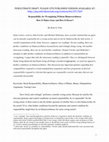Papers by Kyle G Fritz
Hypocrites are often thought to lack the standing to blame others for faults similar to their own... more Hypocrites are often thought to lack the standing to blame others for faults similar to their own. Although this claim is widely accepted, it is seldom argued for. We offer an argument for the claim that nonhypocrisy is a necessary condition on the standing to blame. We first offer a novel, dispositional account of hypocrisy. Our account captures the commonsense view that hypocrisy involves making an unjustified exception of oneself. This exception-making involves a rejection of the impartiality of morality and thereby a rejection of the equality of persons, which we argue grounds the standing to blame others.

Some writers, such as John Fischer and Michael McKenna, have recently claimed that an agent can b... more Some writers, such as John Fischer and Michael McKenna, have recently claimed that an agent can be morally responsible for a wrong action and yet not be blameworthy for that action. A careful examination of the claim, however, suggests two readings. On one reading, there are further conditions on blameworthiness beyond freely and wittingly doing wrong. On another innocuous reading, there are no such further conditions. Despite Fischer and McKenna's attempts to offer further conditions on blameworthiness in addition to responsibility for wrongdoing, I argue that only the innocuous reading is plausible. Once we distinguish between blame being deserved and blame being all-things-considered appropriate, we need not appeal to further conditions on blameworthiness. This discussion has important upshots regarding how compatibilists respond to certain manipulation arguments and how proponents of derived responsibility respond to criticism that agents are responsible even for outcomes that are not reasonably foreseeable.
Journal Articles by Kyle G Fritz
Hypocrites are often thought to lack the standing to blame others for faults similar to their own... more Hypocrites are often thought to lack the standing to blame others for faults similar to their own. Although this claim is widely accepted, it is seldom argued for. We offer an argument for the claim that nonhypocrisy is a necessary condition on the standing to blame. We first offer a novel, dispositional account of hypocrisy. Our account captures the commonsense view that hypocrisy involves making an unjustified exception of oneself. This exception-making involves a rejection of the impartiality of morality and thereby a rejection of the equality of persons, which we argue grounds the standing to blame others.










Uploads
Papers by Kyle G Fritz
Journal Articles by Kyle G Fritz